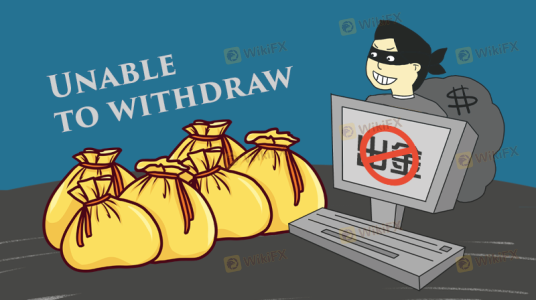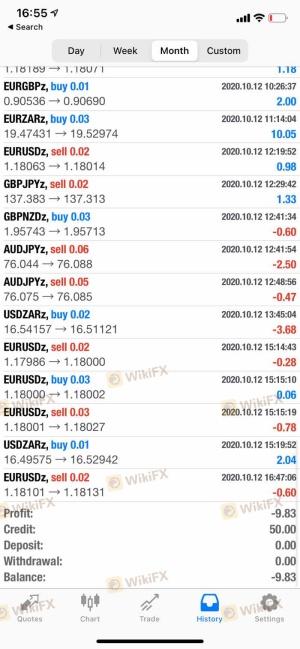Regarding the legitimacy of JP Markets forex brokers, it provides FSCA and WikiBit, .
Is JP Markets safe?

Pros
Cons
Is JP Markets markets regulated?
The regulatory license is the strongest proof.
FSCA Derivatives Trading License (EP)
Financial Sector Conduct Authority
Financial Sector Conduct Authority
Current Status:
RegulatedLicense Type:
Derivatives Trading License (EP)
Licensed Entity:
JP MARKETS SA (PTY) LTD
Effective Date: Change Record
2016-06-07Email Address of Licensed Institution:
--Sharing Status:
No SharingWebsite of Licensed Institution:
--Expiration Time:
--Address of Licensed Institution:
4 CANAL CLOSE2 CENTURY FALLS ROADCENTURY CITY7441Phone Number of Licensed Institution:
27011 881 5638Licensed Institution Certified Documents:


Is JP Markets Safe or a Scam?
Introduction
JP Markets is a South African forex and CFD broker that has gained traction in the trading community since its inception in 2016. Positioned as a prominent player in the African forex landscape, JP Markets aims to provide traders with a range of financial instruments, including forex, commodities, and indices. However, as the forex market is rife with both reputable and dubious brokers, it becomes crucial for traders to conduct thorough due diligence before committing their funds. This article aims to assess the safety and legitimacy of JP Markets through a detailed evaluation of its regulatory status, company background, trading conditions, client fund security, and user experiences. Our analysis is based on a comprehensive review of available data, user feedback, and expert opinions.
Regulation and Legitimacy
Understanding the regulatory framework under which a broker operates is fundamental to assessing its safety. JP Markets is regulated by the Financial Services Board (FSB) in South Africa, holding the license number FSP 46855. This regulatory oversight is designed to ensure that brokers adhere to strict guidelines regarding client fund protection and fair trading practices.
| Regulatory Body | License Number | Regulatory Region | Verification Status |
|---|---|---|---|
| FSB | FSP 46855 | South Africa | Active |
While the FSB is recognized as a legitimate regulatory authority, it is not considered a top-tier regulator like the UK's FCA or Australia's ASIC. This lesser regulatory stature has raised concerns among traders regarding the overall safety of trading with JP Markets. Furthermore, the broker faced a significant setback in 2019 when its license was provisionally suspended due to alleged client fund mismanagement. Although the suspension was later lifted, the incident has left a lingering doubt about the broker's compliance history.
In conclusion, while JP Markets is regulated, the history of its regulatory issues suggests that traders should exercise caution and remain vigilant. The question "Is JP Markets safe?" can be answered with a qualified "yes," but only if traders are aware of the potential risks involved.
Company Background Investigation
JP Markets was founded in 2016 by Justin Paulsen, a South African economist with a background in international finance. The company has rapidly expanded its operations across Africa, establishing itself as a significant player in the forex trading sector. The firm's headquarters are located in Sandton, South Africa, and it has garnered a reputation for providing educational resources aimed at empowering traders.
The management team at JP Markets boasts a mix of financial expertise and industry experience, which is crucial for maintaining operational integrity. However, the company's transparency regarding its ownership structure and financial health has been questioned. While the broker claims to prioritize client education and support, the lack of detailed disclosures about its financial performance and management practices raises concerns about its overall transparency.
In summary, while JP Markets has a solid foundation and experienced management, the opacity surrounding its financial disclosures and ownership structure may deter potential clients. Therefore, assessing whether "Is JP Markets safe?" necessitates a closer look at its operational transparency and commitment to ethical practices.
Trading Conditions Analysis
When evaluating the safety of a broker, understanding its trading conditions is vital. JP Markets offers a range of trading accounts, including STP and ECN accounts, with leverage ratios up to 1:500. The broker claims to provide competitive spreads, although specific details about spread conditions are often vague.
| Cost Type | JP Markets | Industry Average |
|---|---|---|
| Major Currency Pair Spread | 2.0 pips | 1.2 pips |
| Commission Model | $10 per lot | $5 per lot |
| Overnight Interest Range | 0.5% - 1.5% | 0.5% - 1.0% |
JP Markets' spreads, particularly on major currency pairs like EUR/USD, tend to be higher than the industry average, which could impact profitability for traders. Additionally, the commission structure may be considered steep, especially for retail traders who often prefer brokers with lower trading costs.
The broker's fee structure, combined with the lack of clarity regarding certain costs, raises questions about its competitiveness. Therefore, while the trading conditions at JP Markets may be acceptable for some, they may not be ideal for all traders. This leads to the question, "Is JP Markets safe?"—in terms of trading costs, it may not be the most favorable option available.
Client Fund Security
One of the most critical aspects of assessing a broker's safety is its approach to client fund security. JP Markets claims to adhere to strict regulations regarding the segregation of client funds, which means that clients' deposits are kept separate from the broker's operational funds. This practice is essential for protecting client assets in the event of financial difficulties faced by the broker.
Additionally, JP Markets offers negative balance protection, ensuring that clients cannot lose more than their deposited amount. However, the broker's past regulatory issues and the suspension of its license in 2019 due to alleged fund mismanagement cast a shadow over its commitment to safeguarding client funds.
While the measures in place appear to be compliant with regulatory standards, the historical context raises concerns about the broker's reliability. Thus, the question "Is JP Markets safe?" remains complex, as past issues may indicate potential vulnerabilities in client fund protection.
Customer Experience and Complaints
Customer feedback is invaluable in evaluating the safety of any broker. Reviews of JP Markets reveal a mixed bag of experiences, with numerous complaints regarding withdrawal issues, poor customer service, and alleged manipulation of spreads.
| Complaint Type | Severity Level | Company Response |
|---|---|---|
| Withdrawal Delays | High | Slow response |
| Spread Manipulation | Medium | Inconsistent |
| Poor Customer Support | High | Often unresponsive |
Many users have reported difficulties in withdrawing their funds, claiming that requests take an inordinate amount of time to process. Additionally, some clients have expressed dissatisfaction with the quality of customer support, citing long wait times and unhelpful responses.
Two notable cases involve traders who struggled to withdraw their funds for several weeks, receiving vague explanations from customer service. These incidents highlight the potential risks associated with trading with JP Markets and reinforce the need for caution.
In light of these complaints, the question "Is JP Markets safe?" becomes increasingly pertinent, as the broker's customer service and responsiveness may significantly affect the overall trading experience.
Platform and Trade Execution
The trading platform is another critical factor in assessing a broker's overall safety and reliability. JP Markets primarily uses the MetaTrader 4 (MT4) platform, which is widely regarded for its user-friendly interface and robust trading features. However, the platform's performance has been criticized for occasional stability issues and slow execution speeds.
Moreover, there have been reports of slippage and order rejections, which can adversely affect trading outcomes. Traders have voiced concerns about the potential for platform manipulation, especially given the broker's history of regulatory scrutiny.
In conclusion, while the MT4 platform is a reputable choice for many traders, the execution quality and potential for slippage raise concerns about whether "Is JP Markets safe?" The broker's performance in this area warrants careful consideration from potential clients.
Risk Assessment
Assessing the overall risk of trading with JP Markets involves evaluating various factors, including its regulatory status, customer feedback, and trading conditions.
| Risk Category | Risk Level (Low/Medium/High) | Brief Description |
|---|---|---|
| Regulatory Compliance | Medium | Past license suspension raises concerns. |
| Customer Service Quality | High | Numerous complaints regarding support responsiveness. |
| Trading Costs | Medium | Higher spreads and commissions compared to industry averages. |
| Platform Reliability | Medium | Reports of slippage and execution issues. |
Given these risks, potential traders should consider implementing risk management strategies, such as limiting their exposure and utilizing demo accounts to test the brokers services before committing significant capital.
Conclusion and Recommendations
In summary, while JP Markets is a regulated broker in South Africa, its history of regulatory issues, customer complaints, and concerns about trading conditions may cause potential traders to question its safety. The answer to "Is JP Markets safe?" is nuanced; while it operates under regulatory oversight, the broker's past and customer feedback suggest a need for caution.
For traders considering JP Markets, it is advisable to weigh the risks carefully and consider alternative brokers with stronger regulatory credentials and better customer service records. Brokers such as IG, Pepperstone, and Swissquote may offer more robust protections and a more favorable trading environment. Ultimately, conducting thorough research and remaining vigilant are essential steps for any trader looking to navigate the complexities of the forex market safely.
Is JP Markets a scam, or is it legit?
The latest exposure and evaluation content of JP Markets brokers.




JP Markets Similar Brokers Safe
Whether it is a legitimate broker to see if the market is regulated; start investing in Forex App whether it is safe or a scam, check whether there is a license.
JP Markets latest industry rating score is 5.58, the higher the score the safer it is out of 10, the more regulatory licenses the more legitimate it is. 5.58 If the score is too low, there is a risk of being scammed, please pay attention to the choice to avoid.